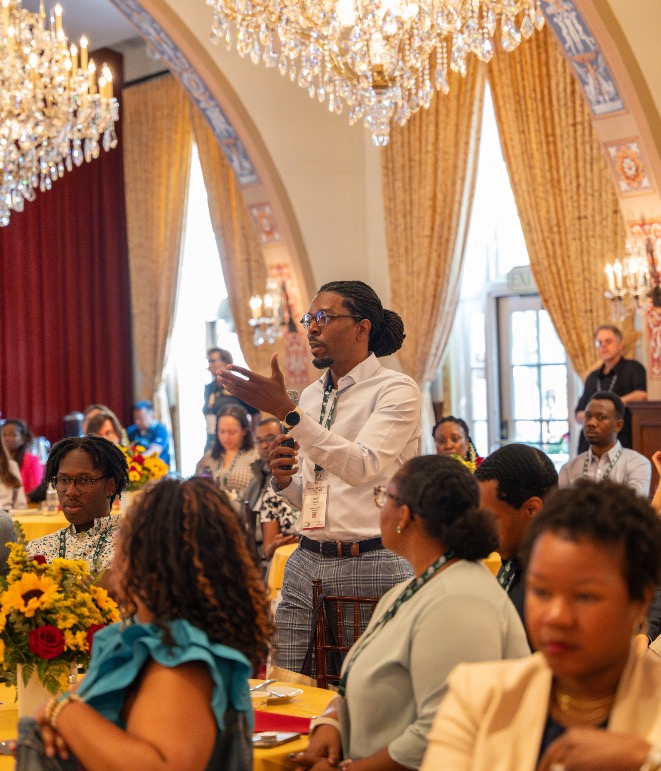
How to Talk with Your Hands
New research led by USC Marshall’s Luca Cascio Rizzo reveals that gestures that visually represent what speakers say help audiences perceive them as more competent and persuasive.
Tenure Project Conference Prepares Junior Faculty to Navigate Tenure Track
Tenure Project Conference Prepares Junior Faculty to Navigate Tenure Track
USC Marshall hosted the third annual conference focusing on workshops, mentorships, and networking for junior faculty from across the nation.

Marshall Dean Geoff Garrett and UCI Dean Ian O. Williamson participate in a panel at the Tenure Project Conference.
[USC Photo/Grayson Adler]
On July 22–24 2024, USC Marshall hosted the third annual Tenure Project Conference, a three-day event that welcomes junior faculty for panels, workshops, and networking aimed at aiding the next steps in their careers. The 114 junior faculty participants hailed from universities across the country, in addition to 65 senior faculty members, who shed light on their own tenure process and inspired and equipped attendees with the understanding and tools to achieve tenure.
Schools determine tenure based on several years of teaching excellence, research, publications and other criteria. All faculty face hurdles within the tenure process. Across the board, however, Black, Native, and Latinx faculty are still experiencing far lower tenure rates than their white colleagues according to the College and University Professional Association for Human Resources (CUPA HR).
The founders of the Tenure Project, faculty from the University of Pennsylvania and the University of Washington, are working to shift this reality by increasing representation and creating a supportive community among junior and senior faculty.
Sarah Townsend, vice dean of diversity, equity, and inclusion and associate professor of management and organization, led Marshall’s planning efforts for the conference and set the tone in her introductory remarks.
“We have an agenda packed with sessions and workshops where our phenomenal senior faculty will lead you in discussions of the important issues affecting Black, Latine,* and Native junior faculty on the often rocky road to tenure in U.S. business schools,” Townsend said to the audience.
Townsend hopes the discussions and networking opportunities will enable attendees to form connections that inform their career aspirations.
“My personal goal for the conference is to ensure that junior faculty attendees are able to build relationships at the conference that enable them to support each other when they’re not at the conference, relationships that can help them through the tenure process,” Townsend said in a previous interview.
A dean’s panel, moderated by Marshall Dean Geoff Garrett, and featuring Ian O. Williamson, Dean of the UC Irvine Paul Merage School of Business, and Frank Hodge, Dean of the University of Washington Foster School of Business covered a number of topics, including how institutions can attract underrepresented groups to academic fields.
“[Business schools are] the single largest part of higher education in the U.S. and all around the world,” Dean Garrett said. “If we want universities to be engines of social transformation, business school is actually the right place to start.”
Williamson, like his colleagues, affirms his commitment to make societal change. In fact, he sees universities as leaders in the field.
“Universities have always been the lightning rod for every social issue this country has ever dealt with,” Williamson said. “We have a system and a mechanism and a conversation and experts that can help guide our society through this in a positive way.”
On each day, attendees broke off for morning and afternoon workshops, including a session on the role of serendipity in success, led by Associate Professor of Clinical Management and Organization Christian Busch, and another on the importance of sponsorship led by Greys Sosic (Senior Vice Dean of Faculty and Academic Affairs) and Rosalind Chow (Carnegie Mellon University).
We have an agenda packed with sessions and workshops where our phenomenal senior faculty will lead you in discussions of the important issues affecting Black, Latine,* and Native junior faculty on the often rocky road to tenure in U.S. business schools.
— Sarah Townsend
Vice Dean of Diversity, Equity, and Inclusion / Associate Professor of Management and Organization
Other sessions focused on building positive professional relationships, fostering connections, and thriving within academia. More technical workshops highlighted research strategies and approaches to the attendees’ specific fields. Each of the discussions highlighted community-building, professional development, and specialized planning for the complexities of the tenure track — many of which were led by Marshall faculty, including Kenneth Ahren, Eric Anicich, Sriram Dasu, Omar El Sawy, Nan Jia, Arthur Kortewag, Chris Parsons, Joe Raffiee, and Rodney Ramcharan.
Shaun Harper, USC Race and Equity Center Founder and Executive Director, gave the opening address on the first day. By achieving tenure, Harper observed, faculty create a collective impact within institutions.
“Diversity on its own is insufficient. It is the equity and inclusion parts that are also essential,” Harper explained. “The institution has a responsibility to all of us to ensure that we have an opportunity for success and a sense of belonging.”
Each day also included dinner and networking opportunities for participants to connect and share experiences as they each strive toward tenure. Through these experiences, attendees could exchange advice and form a support system as they navigate the complicated process.
*Latine is gender-neutral and inclusive of all genders; the Spanish language traditionally uses -e as a gender-neutral ending to words.
RELATED
How to Talk with Your Hands
New research led by USC Marshall’s Luca Cascio Rizzo reveals that gestures that visually represent what speakers say help audiences perceive them as more competent and persuasive.
Study Finds Power Shifts at Work Can Boost Employee Energy and Productivity
New research shows natural ups and downs of workplace influence can sharpen focus, fuel motivation, and support goal pursuit.
USC’s Inaugural AI Summit Explores the Impact of AI at the Intersection of Business, Research, Creativity, and Ethical leadership
Through thought-provoking conversations with tech leaders and innovative research presentations, the summit explored AI’s impact on wide-ranging fields and announced USC’s plans to bring ChatGPT Edu to the community.
Marine Rediscovers Connection and Confidence through Master of Business for Veterans Program
In the Trojan Network of veterans, Thomas Vriens MBV ’21, a director at GHP Management, found a lasting community that helped him thrive after service.
Marshall Faculty Publications, Awards, and Honors: October 2025
We are proud to highlight the many accomplishments of Marshall’s exceptional faculty recognized for recently accepted and published research and achievements in their field.